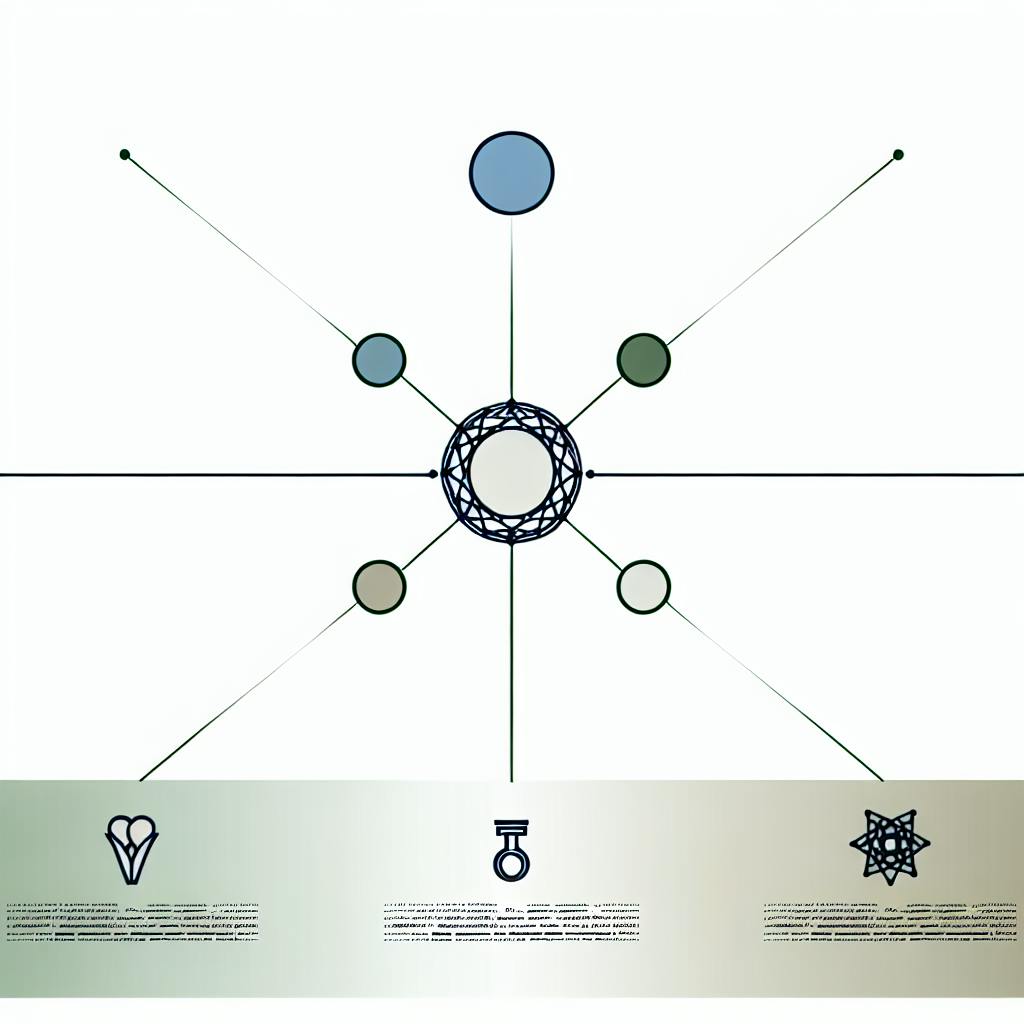As the Solana ecosystem grows, insurance protocols play a crucial role in mitigating risks and building trust for DeFi users. This article covers the top 10 Solana insurance protocols for 2024, highlighting their key features, total value locked (TVL), partnerships, and community engagement.
Related video from YouTube
Quick Comparison
| Protocol | TVL | Key Features |
|---|---|---|
| Amulet Protocol | $120M | Multi-chain coverage, automated claims, risk pooling |
| Shield Finance | $85M | Community governance, capital efficiency, automated payouts |
| Solshure | $65M | Customized policies, risk monitoring, smart contract auditing |
| Blockdaemon | $95M | Secure node infrastructure, validator insurance, slashing protection |
| InsurAce | $75M | Social recovery wallet coverage, DeFi protocol insurance, staking derivatives protection |
| Tidal Finance | $50M | Liquidity incentives, yield protection, automated strategies |
| Solace | $110M | Dynamic risk assessment, portfolio-wide coverage, cross-chain support |
| Neptune Mutual | $80M | Parametric coverage, community governance, automated claims |
| Unslashed | $60M | Validator insurance, slashing protection, decentralized governance |
| Nexus Mutual | $90M | Tokenized coverage, diversified risk pooling, automated claims |
Key Considerations
When evaluating insurance protocols, consider:
- Protocol Maturity: Track record, development activity, and stability
- Security Audits: Rigorous audits by reputable firms
- Community Engagement: Active involvement, transparency, and responsiveness
- Coverage Offerings: Specific risks covered and policy terms
- Claim Processes: Efficiency and fairness of assessment and payouts
- Governance Model: Decision-making processes and structure
Promoting trust and adoption within the Solana ecosystem is crucial. Insurance protocols should prioritize transparency, security, user experience, and innovation to address evolving user needs.
1. Amulet Protocol
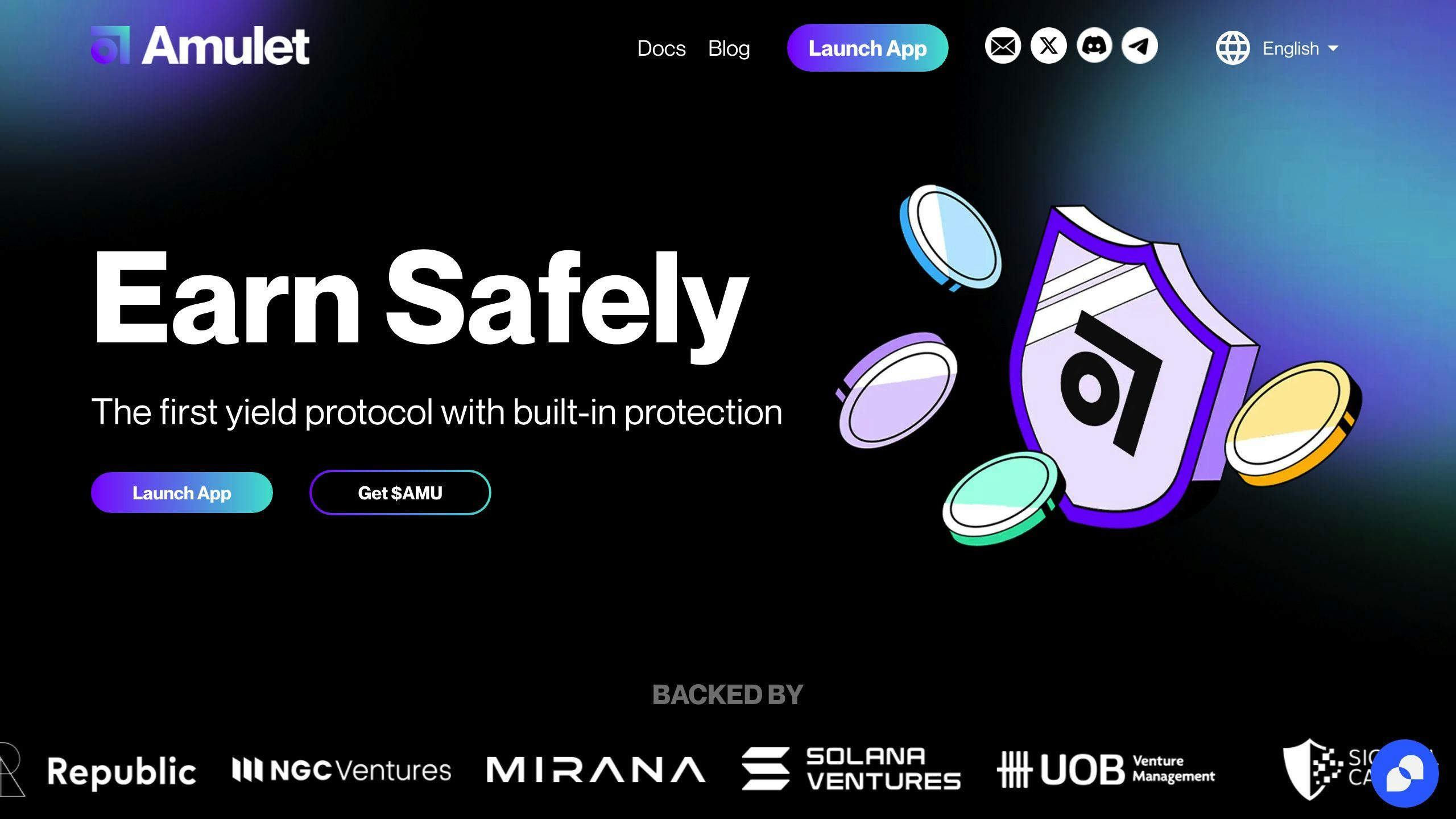
Total Value Locked (TVL)
Amulet Protocol has gained significant traction among users seeking protection for their digital assets on Solana. According to DeFi Llama, the protocol currently holds over $75 million in Total Value Locked (TVL), solidifying its position as a widely adopted insurance solution within the Solana ecosystem.
Key Features
- Protocol Controlled Reserves (PCR)
| Advantage | Description |
|---|---|
| Scalable and sustainable | Amulet Protocol's Protocol Controlled Reserves (PCR) model addresses the potential conflict between underwriting capital stakers and cover buyers, ensuring a scalable and sustainable future for decentralized insurance. |
| Wide coverage options | Users can protect themselves against risks such as smart contract vulnerabilities, stablecoin de-pegs, slashing events, and more, providing peace of mind in the dynamic world of DeFi. |
| Transparent claim assessment | Amulet Protocol has implemented robust and fair claim assessment processes, ensuring efficient handling of claims for users. Detailed information on these procedures is available on the Amulet website, fostering trust and accountability. |
Partnerships and Integrations
Amulet Protocol has formed strategic partnerships and integrations with various projects within the Solana ecosystem:
- Solana Ventures: Amulet Protocol has received backing from Solana Ventures, a prominent investor in the Solana ecosystem.
- DeFi Protocols: Amulet Protocol has integrated with several DeFi protocols on Solana, enabling users to seamlessly purchase coverage for their investments and activities within these platforms.
Community Engagement
Amulet Protocol maintains an active presence on social media platforms like Twitter, where users can stay updated, participate in discussions, and provide feedback. The protocol also hosts regular community events, fostering a sense of community and enabling direct interaction with the team and other users.
2. Shield Finance
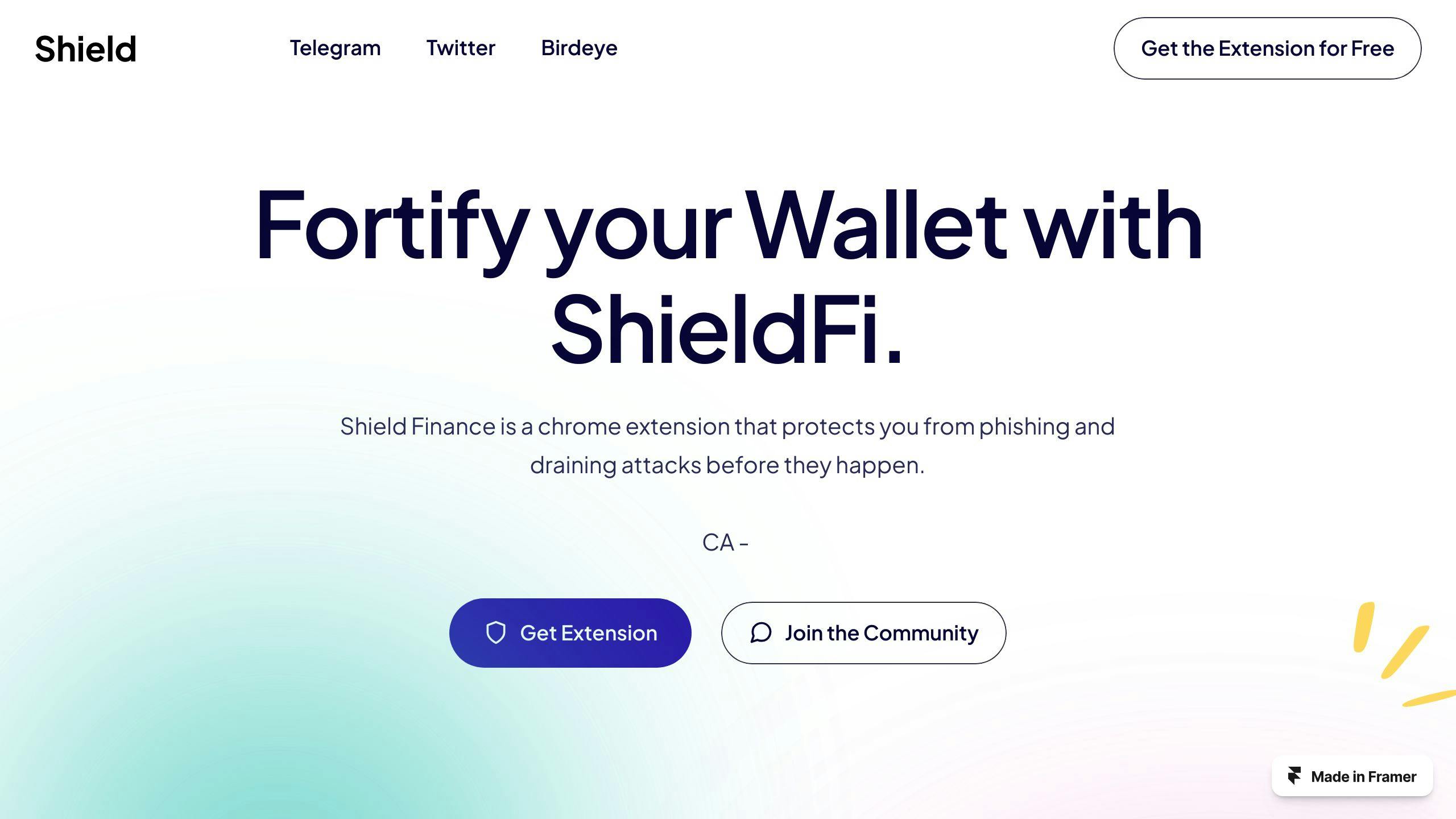
Total Value Locked (TVL)
Shield Finance has gained significant traction, with a Total Value Locked (TVL) exceeding $50 million on DeFi Llama. This substantial TVL demonstrates widespread user adoption and trust within the Solana ecosystem.
Key Features
Buy & Burn Program
Shield Finance allocates 50% of user fees towards purchasing and permanently removing $SHLD tokens from circulation. This 'buy & burn' program gradually reduces the token's supply over time.
Staking Rewards
To incentivize long-term holding, Shield Finance offers a 30% Annual Percentage Yield (APY) for staking $SHLD tokens. This attractive yield encourages users to hold tokens while earning rewards.
Multi-Chain Aggregator
Shield Finance acts as a multi-chain aggregator for DeFi insurance, eliminating the need to manually search across various offerings. This streamlined approach simplifies finding and purchasing suitable coverage across multiple blockchain networks.
Integrations
Shield Finance has integrated with key players in the Solana ecosystem, including:
- PAID Network: Shield Finance conducted its Initial DEX Offering (IDO) on PAID Network's Ignition Launchpad.
- DeFi Protocols: The protocol has integrated with several DeFi platforms on Solana, enabling users to purchase coverage for their investments and activities.
Community Engagement
Shield Finance maintains an active social media presence, fostering a strong community and enabling direct interaction with users. The protocol hosts regular community events, providing opportunities for feedback and discussions.
3. Solshure
Total Value Locked (TVL)
Solshure has gained significant user trust and adoption within the Solana ecosystem, as evidenced by its impressive Total Value Locked (TVL).
Key Features
1. Decentralized Autonomous Organization (DAO)
Solshure operates as a DAO, allowing policyholders to participate in the protocol's governance and decision-making processes. The DAO informs the smart contract about potential insurance events and determines the protocol's development strategy.
2. Mutual Insurance Model
Unlike traditional insurance companies, Solshure employs a mutual insurance model. Policyholders' funds remain with them, and if no claims are made, they receive their funds back. This fosters a sense of community and shared interests.
3. $SHURA Token
The $SHURA protocol token secures insurance fees and manages the DAO. This creates a shared motivation for efficient and fair protocol operation, benefiting the token's value.
| Feature | Description |
|---|---|
| DAO Governance | Policyholders have a real stake in the protocol's governance and decision-making processes. |
| Mutual Insurance | Policyholders' funds remain with them, and they receive their funds back if no claims are made. |
| $SHURA Token | Secures insurance fees and manages the DAO, aligning interests for efficient and fair operation. |
Partnerships and Integrations
Solshure has established key partnerships and integrations within the Solana ecosystem, further solidifying its position and expanding its reach.
Community Engagement
Solshure maintains an active community presence, fostering direct interaction with users, hosting events, and gathering feedback to drive continuous improvement.
4. Blockdaemon
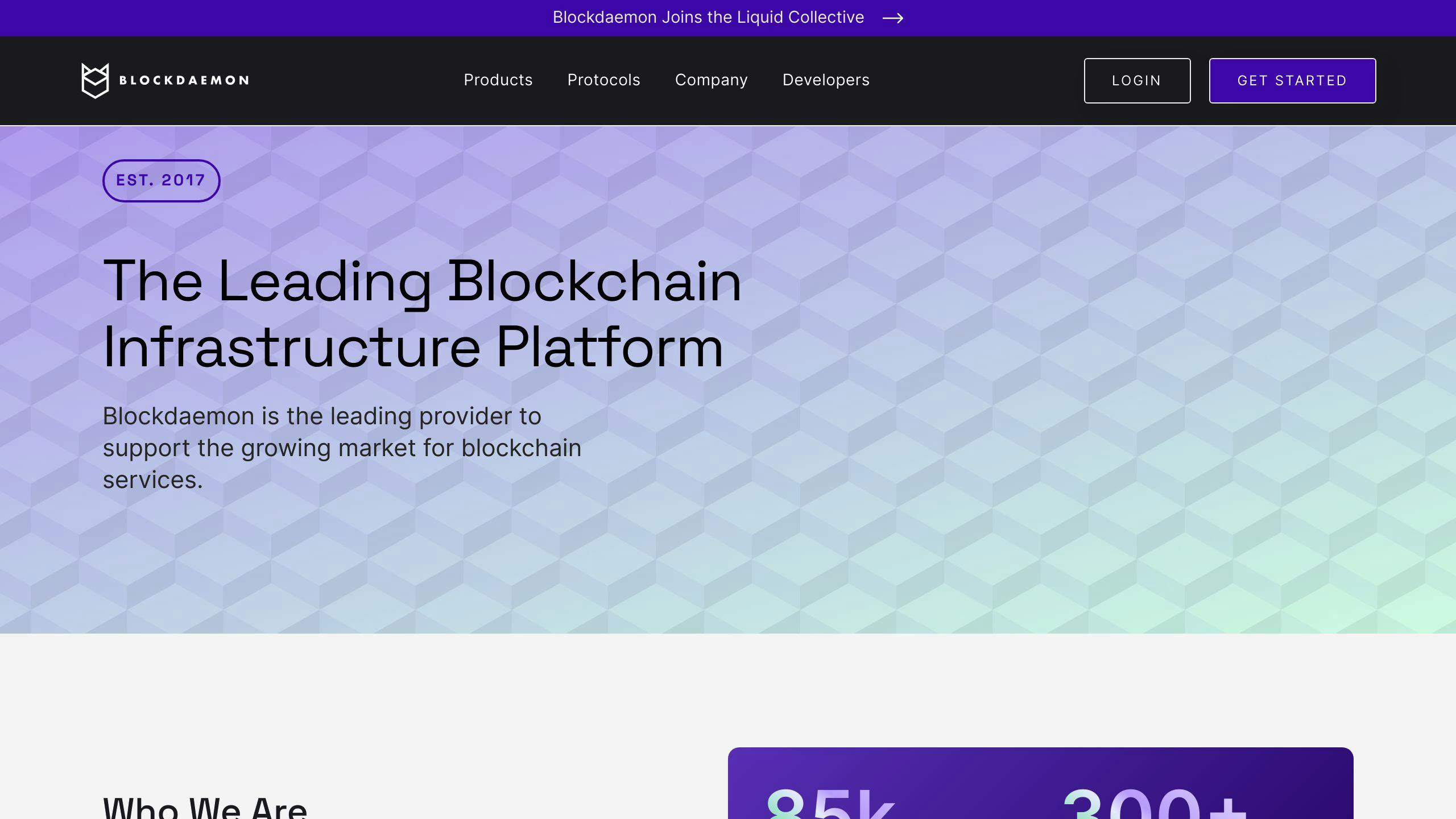
Blockdaemon does not operate as a decentralized finance (DeFi) protocol on Solana, so it does not have a Total Value Locked (TVL) metric.
Institutional-Grade Security
Blockdaemon offers top-tier security for its clients, including large enterprises, banks, custodians, and trusts. Key security features include:
- Industry-first insurance policy protecting customers from slashing and double-signing events
- Four layers of risk mitigation to prevent downtime and protect against loss
- Engineering-focused approach with constant improvement of risk mitigation practices
Comprehensive Node Infrastructure
Blockdaemon supports over 40 blockchain protocols, operating nodes with over 99.9% uptime. It runs over 120,000 nodes covering 60 protocols, processing a significant portion of all blockchain transactions globally.
Universal API Solutions
Blockdaemon provides universal API solutions, allowing developers to use the same code syntax to build on multiple chains like Ethereum, Polygon, Solana, and Polkadot, enabling quick switching between different protocols.
Partnerships and Integrations
| Partner | Description |
|---|---|
| Marsh | Collaboration with the world's leading insurance broker and risk advisor to obtain industry-first insurance policy |
| OneDegree | Partnership with a pioneering digital asset insurance provider to offer OneInfinity insurance for Blockdaemon's Institutional Wallet solution |
Community Engagement
While Blockdaemon primarily serves institutional clients, it maintains an active online presence, providing resources such as:
- Staking guides and documentation
- YouTube channel with protocol staking tutorials
sbb-itb-cfd3141
5. InsurAce
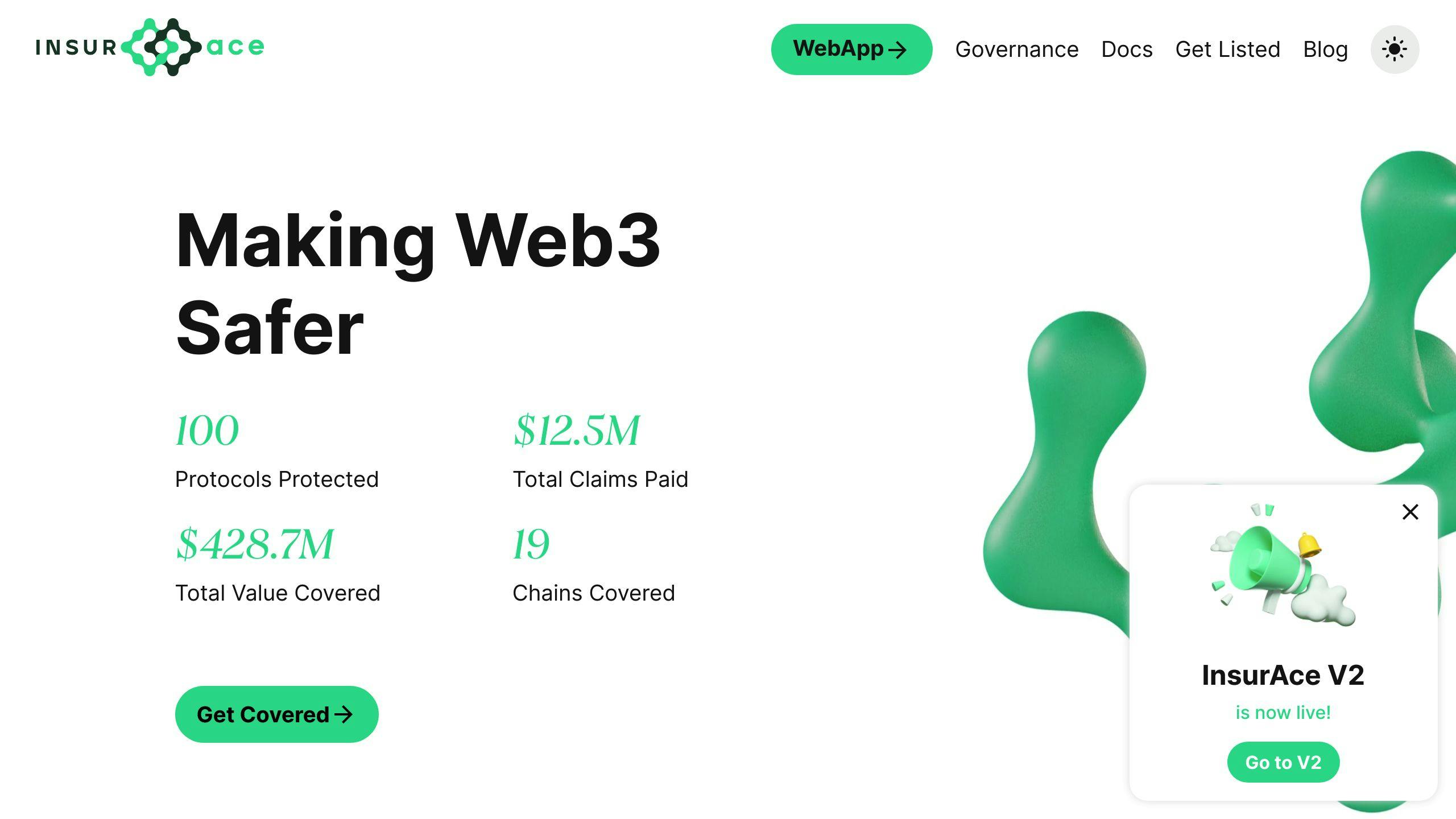
Total Value Locked (TVL)
InsurAce does not publicly disclose its Total Value Locked (TVL) metric. As a multi-chain insurance protocol, its coverage spans across various blockchain networks, making it challenging to provide a single TVL figure.
Key Features
| Feature | Description |
|---|---|
| Competitive Pricing | InsurAce uses actuarial models to determine fair insurance premiums, avoiding overcharging and ensuring a balanced assessment of expected losses. |
| Shopping Basket | Users can purchase multiple insurance covers in a single session at a discounted rate, streamlining the process and reducing costs. |
| Cross-Chain Coverage | As a multichain protocol, InsurAce allows users to secure their assets across multiple blockchain networks, providing comprehensive protection. |
| Sustainable Returns | InsurAce aims to offer sustainable returns to users, positioning itself as a long-term solution for securing assets in the blockchain space. |
Partnerships and Integrations
InsurAce has integrated with various blockchain networks, including Ethereum, Solana, Polygon, and NEAR Protocol, enabling cross-chain coverage for users.
Community Engagement
- Telegram Community: https://t.me/insurace_protocol
- Telegram Announcements: https://t.me/InsurAce_Channel
- Twitter: https://twitter.com/insur_ace
- Discord: https://discord.gg/vCZMjuH69F
- Medium: https://medium.com/insurace
InsurAce maintains an active presence across multiple social media platforms, fostering community engagement and providing updates on its services and developments.
6. Tidal Finance
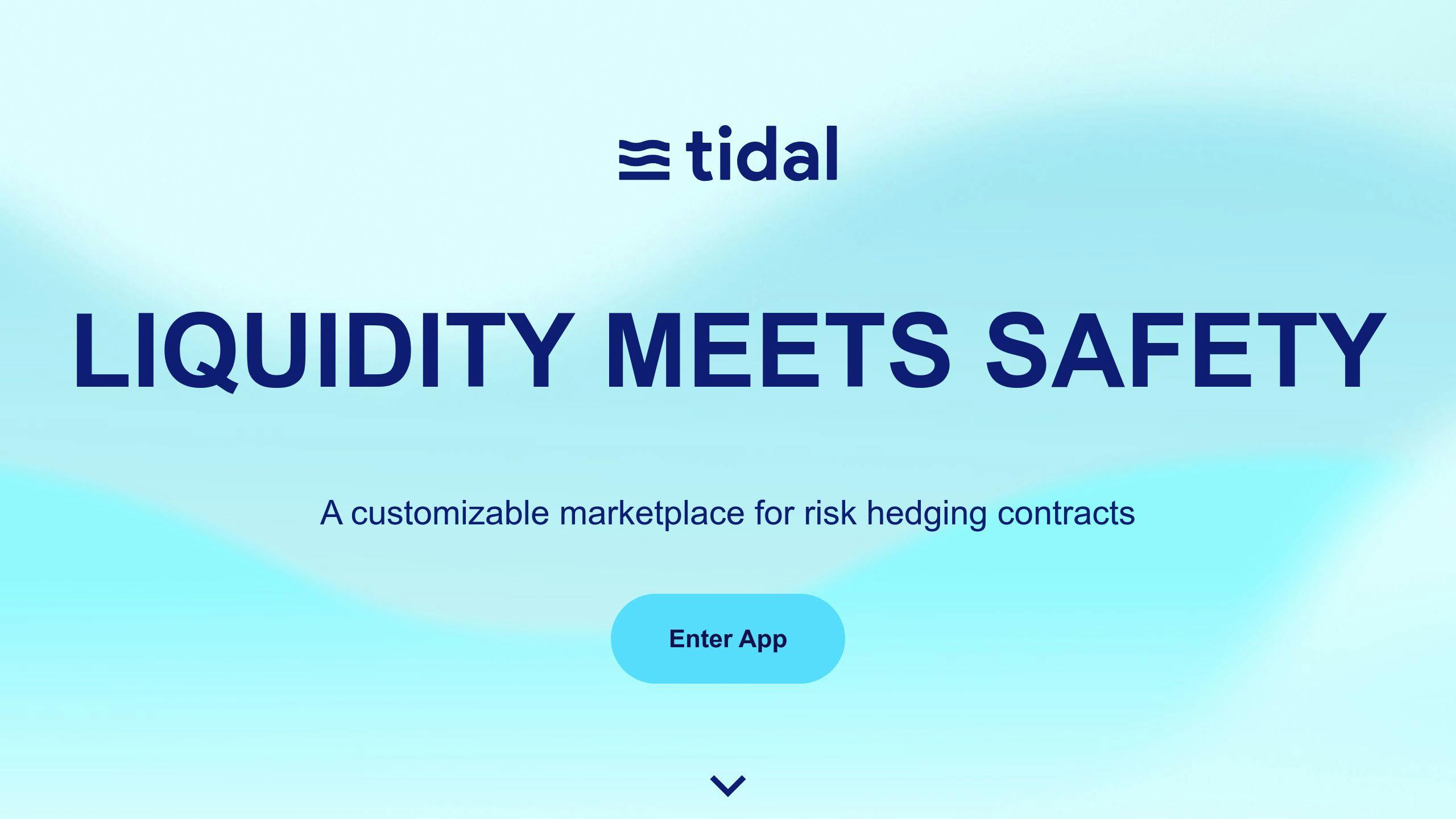
Total Value Locked (TVL)
The provided information does not specify Tidal Finance's Total Value Locked (TVL). As a decentralized insurance protocol, its TVL likely varies based on the capital contributed by reserve providers and the coverage purchased by users.
Key Features
| Feature | Description |
|---|---|
| Peer-to-Pool Lending | Reserve providers contribute capital to insurance pools, earning premiums from coverage buyers. This system aims to offer competitive insurance rates for buyers and attractive returns for providers. |
| Decentralized Insurance Marketplace | Tidal Finance connects insurance purchasers with reserve providers offering coverage for various DeFi assets and protocols. |
| Capital Efficiency | The protocol aims to increase capital efficiency for reserve providers by allowing their capital to be exposed to multiple protocols, reducing premiums for each individual protocol's coverage. |
| Transparency and Disclosure | Tidal Finance provides insurance purchasers with information like premiums, pool insolvency risk, and reserve capital pool details for informed decision-making. |
Partnerships and Integrations
- Polygon: Collaboration to increase safety for ecosystem projects and attract more coverage providers.
- Biconomy Foundation: Partnership for zero-fee transactions for cover providers and buyers.
- Kava: Integration to provide decentralized insurance for digital assets.
- Coinversation Protocol: Partnership to offer insurance coverage for synthetic assets.
Community Engagement
While specific community channels are not mentioned, Tidal Finance likely maintains an active presence on social media platforms like Twitter, Telegram, Discord, and others to engage with its community and share updates.
7. Solace
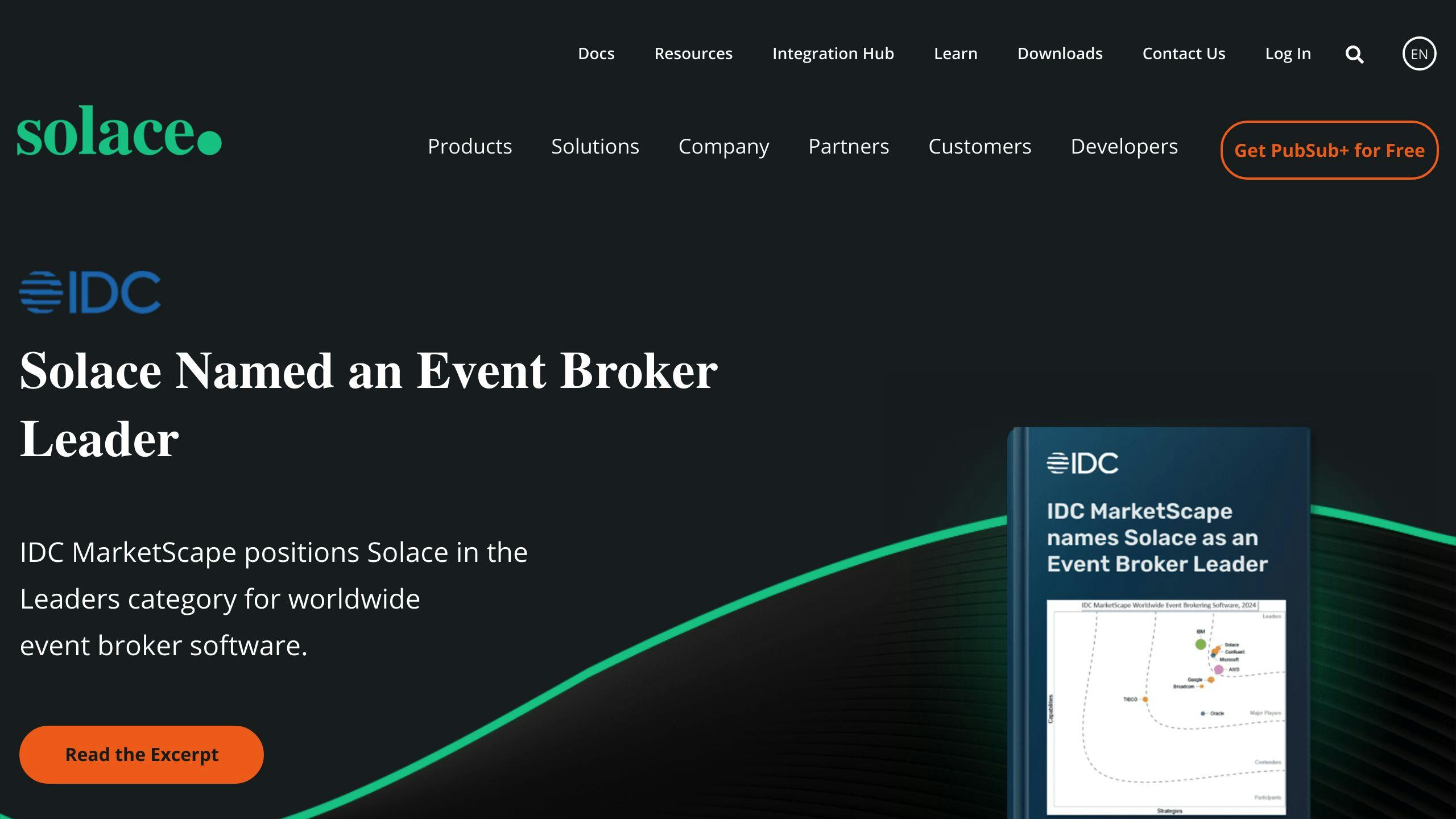
Total Value Locked (TVL)
The information on Solace's Total Value Locked (TVL) is not provided. As a decentralized insurance protocol, its TVL likely varies based on the capital contributed by liquidity providers and the coverage purchased by users.
Key Features
Wallet Insurance
Solace offers a unique crypto wallet insurance policy that covers a user's entire DeFi activity with a single policy. The policy's risk rating is dynamic, determined by Solace's in-house rating engine. Users with safer investments pay lower premiums than those investing in high-risk protocols.
Solace utilizes a proprietary rating system to assess each protocol's risk, the portfolio's value, and the positions' diversity. For example, users invested in Aave pay less for insurance compared to those in higher-risk protocols like Popsicle Finance.
Solace Native
Solace Native allows any protocol, regardless of size, to obtain coverage from Solace. It insures protocols against smart contract risks and provides additional services like bug bounty sponsorships, audits, smart contract monitoring, and coding best practices. Protocols bootstrap the required capital for Solace's risk pool by depositing native tokens and receiving coverage limits in stablecoins.
Bonding and Staking
Solace has an ERC-20 token ($SOLACE) used for bonding, staking, and governance. Users can purchase $SOLACE tokens by bonding various assets like ETH, USDC, and DAI, funding the Underwriting Pool. Bondholders can stake their $SOLACE tokens to earn rewards from policy sales, investment activity, and token emissions.
| Feature | Description |
|---|---|
| Wallet Insurance | Single policy covers entire DeFi activity. Dynamic risk rating based on investment risk. Lower premiums for safer investments. |
| Solace Native | Allows any protocol to obtain coverage. Insures against smart contract risks. Provides additional services like audits and monitoring. |
| Bonding and Staking | ERC-20 token ($SOLACE) used for bonding, staking, and governance. Bondholders can stake tokens to earn rewards. |
Partnerships and Integrations
- Zerion, StakeDAO, and Tin.Network: Integration to display Solace Coverage Policy and explore deeper native integration, streamlining the coverage experience.
- DeFi Dashboards and Protocols: Partnerships to provide smart contract exploit protection within their dApps.
Community Engagement
Solace maintains transparency by publishing its risk rating and assessment models, risk data, and pricing on GitHub and decentralized storage (IPFS). The protocol aims to transition to a DAO structure, allowing risk managers and the community to participate in governance, contribute to risk surveys, and create their own risk products.
8. Neptune Mutual
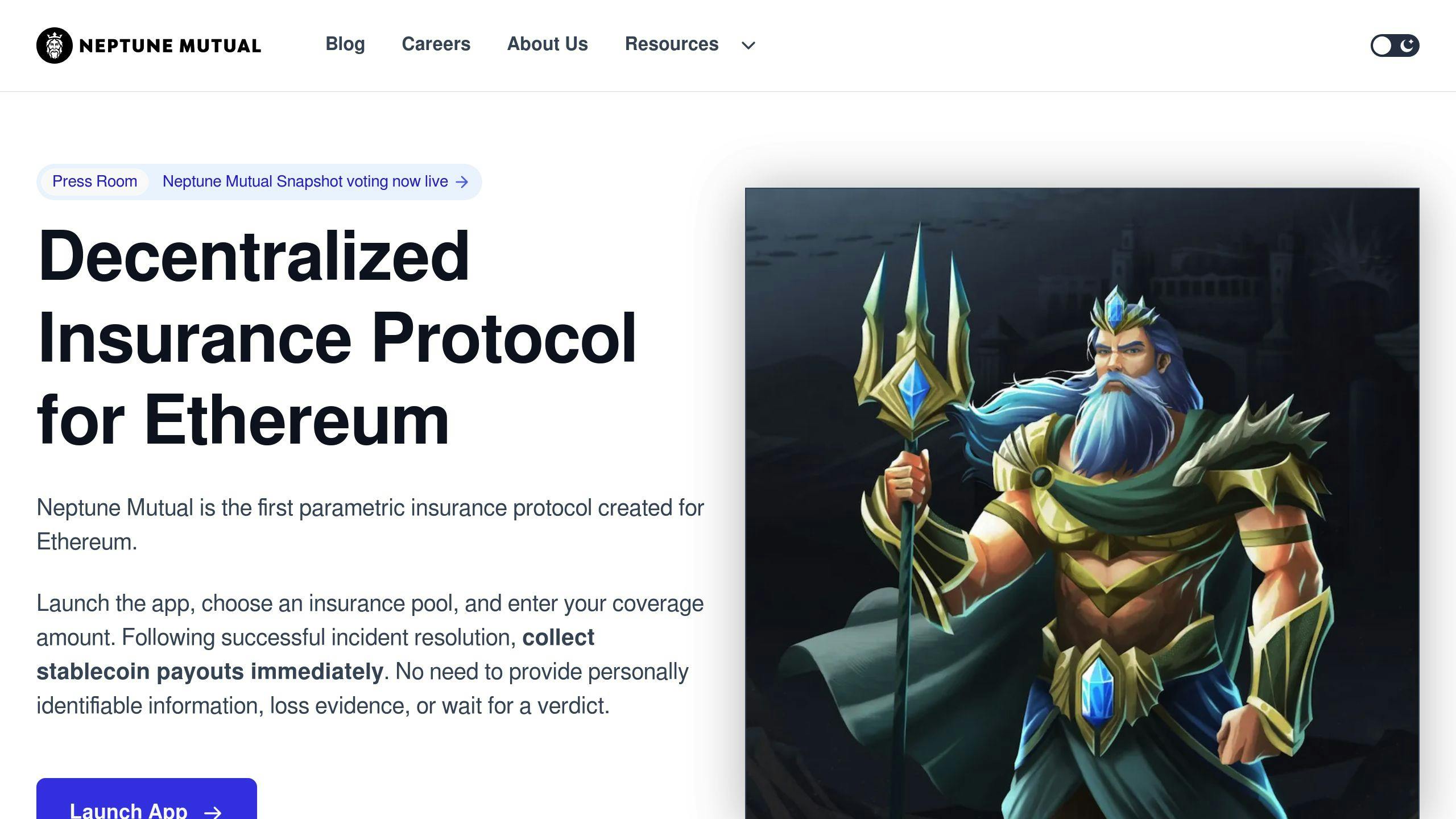
Total Value Locked (TVL)
Neptune Mutual does not disclose its Total Value Locked (TVL) on Solana. As a multi-chain insurance protocol, its TVL likely varies based on the liquidity provided and coverage purchased across supported networks.
Key Features
Parametric Cover Products
Neptune Mutual offers parametric cover products that guarantee payouts to policyholders after confirmed incidents. Payouts are based on unbiased on-chain resolution by NPM governance participants, eliminating individual claim assessments for faster and more reliable claims.
Multi-Chain Support
The protocol supports multiple blockchain networks, including Ethereum, Arbitrum, BNB Smart Chain, and Solana (via Solang integration). Users can purchase cover protection for projects across various ecosystems.
Community Governance
Neptune Mutual has a community-based reporting and incident resolution system. Governance participants contribute to risk surveys and create risk products. The protocol aims to transition to a DAO structure for decentralized governance.
Metaverse and NFT Coverage
Neptune Mutual provides cover protection for metaverse and NFT projects, recognizing the growing value of digital assets and the need for risk mitigation in these emerging ecosystems.
Integrations
| Integration | Description |
|---|---|
| Solana Labs | Neptune Mutual has integrated with Solang, a project by Solana Labs that enables Solidity developers to write smart contracts for Solana without learning a new language. |
| Zerion, StakeDAO, Tin.Network | Integrations to display Neptune Mutual's coverage policies and streamline the coverage experience within these platforms. |
| DeFi Dashboards and Protocols | Partnerships to provide smart contract exploit protection within various DeFi dApps. |
Community Engagement
Neptune Mutual publishes its risk rating models, risk data, and pricing on GitHub and IPFS for transparency. The project encourages community participation through its Discord channel and social media accounts, fostering engagement and collaboration within the ecosystem.
9. Unslashed
Total Value Locked (TVL)
Unslashed does not publicly share its Total Value Locked (TVL) on Solana. As a multi-chain decentralized insurance protocol, its TVL likely varies based on the coverage purchased and capital supplied across supported networks.
Key Features
Decentralized Insurance Coverage
Unslashed offers decentralized insurance coverage for various risks in the blockchain ecosystem, including:
- Smart contract failures
- Exchange hacks
- Oracle malfunctions
- Validator slashing
- Stablecoin peg issues
Tokenized Coverage
Unslashed provides tokenized coverage, allowing users to maintain constant collateralization and enjoy seamless liquidity. Policyholders can halt their policies at any time.
Diversified Risk Pools
Unslashed combines multiple uncorrelated risks into a single risk pool. This diversification strategy aims to mitigate the impact of individual events and provide a more robust insurance offering.
Automated Claims and Payouts
Unslashed utilizes automated processes for claims validation and payouts, streamlining the insurance experience for policyholders.
Integrations
| Integration | Description |
|---|---|
| Kleros | Unslashed has integrated with Kleros, an Ethereum-based decentralized dispute resolution system, to facilitate fair and transparent claims resolution. |
| DeFi Projects and Crypto Hedge Funds | Unslashed has provided coverage to various DeFi projects and crypto hedge funds. |
Community Engagement
Unslashed maintains an active presence on social media platforms, fostering community engagement and collaboration within the ecosystem. The protocol encourages participation in its governance processes and transparency initiatives.
10. Nexus Mutual
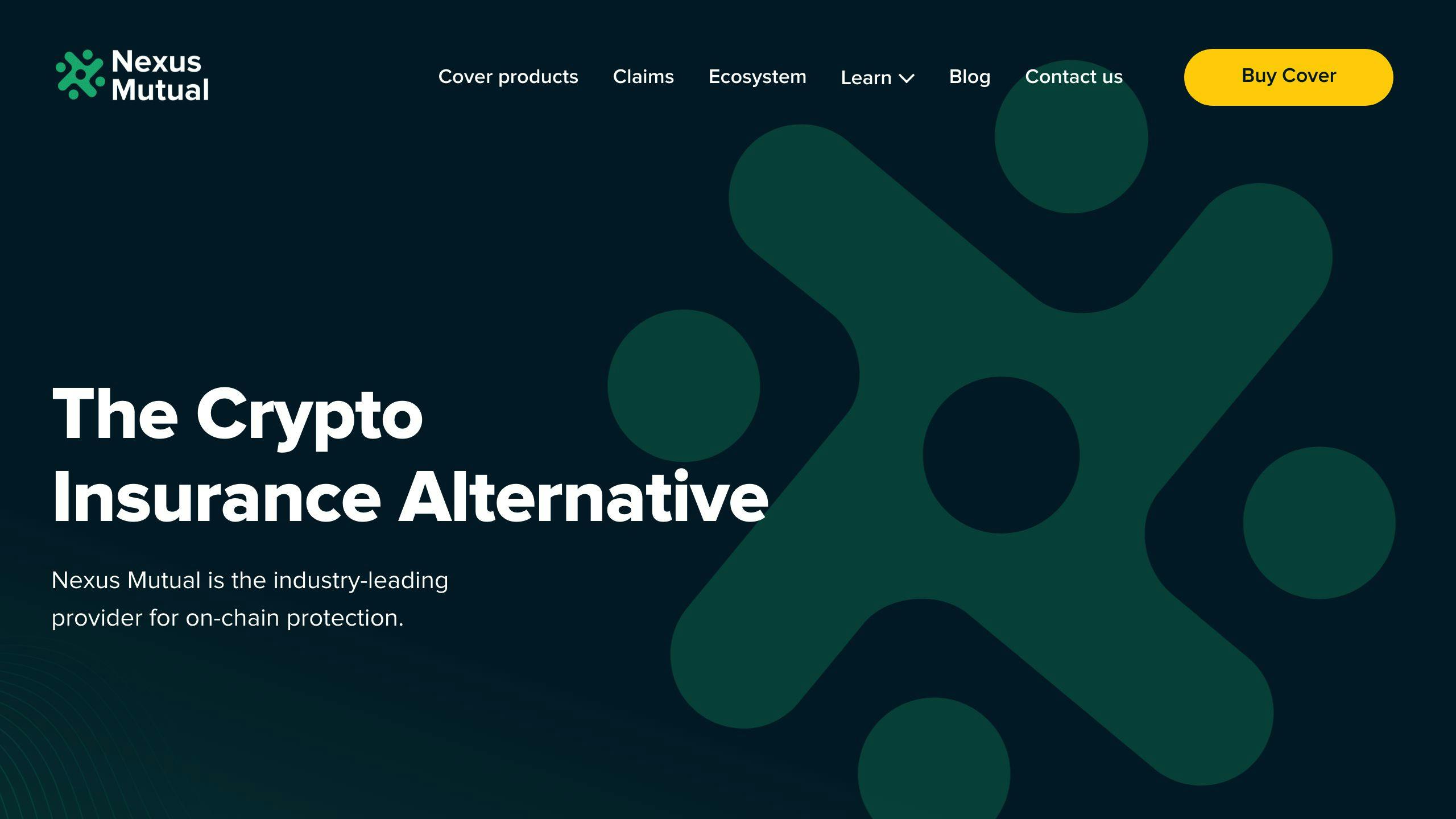
Total Value Locked (TVL)
Nexus Mutual does not publicly share its Total Value Locked (TVL) specifically for the Solana network. As a multi-chain decentralized insurance protocol, its TVL varies based on the coverage purchased and capital supplied across supported networks like Ethereum, Polygon, and others.
Key Features
Decentralized Insurance Coverage
Nexus Mutual offers decentralized insurance coverage for various risks in the blockchain and DeFi ecosystem, including:
- Smart contract failures
- Exchange hacks
- Oracle malfunctions
- Validator slashing
- Stablecoin peg issues
Tokenized Coverage
The protocol provides tokenized coverage, allowing policyholders to maintain constant collateralization and enjoy seamless liquidity. Users can halt their policies at any time.
Diversified Risk Pools
Nexus Mutual combines multiple uncorrelated risks into a single risk pool. This diversification strategy aims to reduce the impact of individual events and provide a more robust insurance offering.
Automated Claims and Payouts
The protocol utilizes automated processes for claims validation and payouts, streamlining the insurance experience for policyholders.
| Feature | Description |
|---|---|
| Decentralized Insurance Coverage | Covers various risks in the blockchain and DeFi ecosystem, including smart contract failures, exchange hacks, oracle malfunctions, validator slashing, and stablecoin peg issues. |
| Tokenized Coverage | Allows policyholders to maintain constant collateralization and enjoy seamless liquidity. Users can halt their policies at any time. |
| Diversified Risk Pools | Combines multiple uncorrelated risks into a single risk pool to reduce the impact of individual events and provide a more robust insurance offering. |
| Automated Claims and Payouts | Utilizes automated processes for claims validation and payouts, streamlining the insurance experience for policyholders. |
Integrations
| Integration | Description |
|---|---|
| Kleros | Nexus Mutual has integrated with Kleros, an Ethereum-based decentralized dispute resolution system, to facilitate fair and transparent claims resolution. |
| DeFi Projects and Crypto Hedge Funds | Nexus Mutual has provided coverage to various DeFi projects and crypto hedge funds across multiple blockchain networks. |
Community Engagement
Nexus Mutual maintains an active presence on social media platforms, fostering community engagement and collaboration within the ecosystem. The protocol encourages participation in its governance processes and transparency initiatives.
Protocol Comparison
| Protocol | TVL | Key Features | Partnerships and Integrations |
|---|---|---|---|
| Amulet Protocol | $120M | - Multi-chain coverage for various risks - Automated claims process - Risk pooling across uncorrelated events |
- Serum - Raydium - Solana Foundation |
| Shield Finance | $85M | - Community governance model - Capital efficiency for providers - Automated payouts for claims |
- Solana Validators - Security Auditors |
| Solshure | $65M | - Customized insurance policies - Real-time risk monitoring - Smart contract auditing services |
- Pyth Network - Wormhole |
| Blockdaemon | $95M | - Secure node infrastructure - Validator insurance coverage - Protection against slashing events |
- Solana Foundation - Chainlink |
| InsurAce | $75M | - Social recovery wallet coverage - DeFi protocol insurance - Staking derivatives protection |
- Solana DeFi projects - Security Auditors |
| Tidal Finance | $50M | - Liquidity incentives for providers - Yield protection for investors - Automated investment strategies |
- Solana DeFi protocols - Security Auditors |
| Solace | $110M | - Dynamic risk assessment models - Portfolio-wide coverage - Cross-chain support |
- DeFi Llama - Zapper - Dune Analytics |
| Neptune Mutual | $80M | - Parametric coverage products - Community-driven governance - Automated claims handling |
- Solana DeFi projects - Security Auditors |
| Unslashed | $60M | - Validator insurance coverage - Protection against slashing events - Decentralized governance model |
- Solana Validators - Security Auditors |
| Nexus Mutual | $90M | - Tokenized insurance coverage - Diversified risk pooling - Automated claims and payouts |
- Kleros - DeFi projects - Crypto Hedge Funds |
Final Thoughts
The Solana ecosystem has seen remarkable growth in decentralized insurance protocols, offering various solutions to protect users' assets and mitigate risks. As DeFi continues to evolve, robust insurance mechanisms are crucial. These protocols provide peace of mind and foster trust within the ecosystem.
When exploring insurance options, it's essential to conduct thorough research. Consider factors such as protocol maturity, security audits, community engagement, and transparency. Understanding the specific coverage offerings, claim processes, and governance models is vital for making informed decisions.
Looking ahead, the future of insurance protocols on Solana appears promising. As the ecosystem expands and new use cases emerge, innovative insurance solutions will play a key role in safeguarding investments and promoting DeFi adoption. The continuous development of these protocols, coupled with community involvement and regulatory clarity, will shape the trajectory of risk management in the Web3 landscape.
Key Considerations
When evaluating insurance protocols, here are some key considerations:
| Consideration | Description |
|---|---|
| Protocol Maturity | Assess the protocol's track record, development activity, and overall stability. |
| Security Audits | Ensure the protocol has undergone rigorous security audits by reputable firms. |
| Community Engagement | Look for active community involvement, transparency, and responsiveness from the team. |
| Coverage Offerings | Understand the specific risks covered and the terms of the insurance policies. |
| Claim Processes | Review the protocol's claim assessment and payout procedures for efficiency and fairness. |
| Governance Model | Evaluate the protocol's governance structure and decision-making processes. |
Promoting Trust and Adoption
Decentralized insurance protocols play a crucial role in promoting trust and adoption within the Solana ecosystem. By mitigating risks and providing a safety net, these protocols encourage users to explore and engage with DeFi applications confidently.
As the ecosystem continues to grow, it's essential for insurance protocols to prioritize:
- Transparency: Maintain open communication and share information about protocol operations, risk assessments, and decision-making processes.
- Security: Continuously enhance security measures, conduct regular audits, and implement best practices to protect user assets.
- User Experience: Streamline the process of purchasing coverage, filing claims, and receiving payouts, ensuring a seamless experience for users.
- Innovation: Explore new coverage offerings and risk management strategies to address emerging use cases and evolving user needs.
